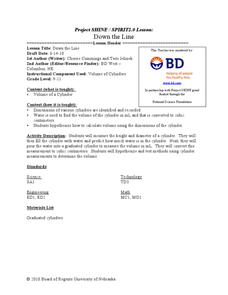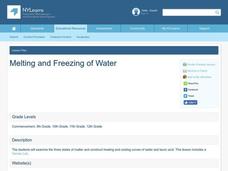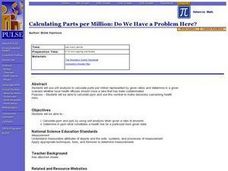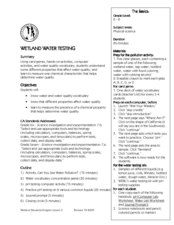Pennsylvania Department of Education
Build What I've Created
n this geometric lesson, students define and identify two dimensional shapes based on their attributes. They complete worksheets based on the geometric concepts.
Federal Reserve Bank
The Great Inflation: A Historical Overview and Lessons Learned
Your young economists will explore the roots of fears about high inflation by learning the effects of rising prices during the world wars and in particular the Great Inflation of the 1970s.
Royal Society of Chemistry
Organic Molecules Day—Chemistry Outreach
In search of an organic lab that employs real-life techniques and analysis methods? Groups carry out the nitration of methyl benzoate, then attempt to determine the number and location of the nitro groups added to the benzene ring....
NASA
Christa's Lost Lesson: Effervescence
How are chemical reactions affected by gravity? Learners explore the phenomenon of effervescence as part of the Christa's Lost Lessons series. They compare findings in an experiment on effervescence to a video of a similar experiment in...
Science Geek
Intermolecular Forces of Attraction
Chemists love London (dispersion forces)! Presentation begins with an explanation of intermolecular forces including hydrogen bonding, dipole-dipole attraction, and London dispersion forces. It also covers polarity and the relative...
LABScI
Freezing Point Depression: Why Don’t Oceans Freeze?
Can you go ice fishing in the ocean? Learners examine the freezing point of different saltwater solutions. Each solution has a different concentration of salt. By comparing the freezing points graphically, they make conclusions...
Curated OER
Helium Balloon Race
Students determine the force of a helium balloon that allows it to rise a specific distance. In this helium lesson students calculate the amount of paper needed to construct a weight and determine the density of a piece of...
Curated OER
Travel Mug Design
Students create and develop a travel mug. They create visuals and a three dimensional infomercial. They apply an engineering design and demonstrate knowledge of thermodynamics involved in heat transfer. They illustrate Newton's Law of...
Pennsylvania Department of Education
Determine Volume of Solids Using Water Displacement
Learners explore math functions by completing math equation worksheets. In this inequality lesson, students define a list of math terms and discuss the difference between an equation and inequality. Learners utilize a real life situation...
Shodor Education Foundation
Volume of Prisms
Explore the concept of volume of prisms using an applet to perform the calculations. The link to the interactive applet is embedded into the lesson plan as well as a link to associated data sheets. Get your math class to the computer lab...
Curated OER
Volume of Rectangular Prisms
Introduce the procedure needed to find the volume of a rectangular prism. Learners rank various prisms such as cereal boxes and tissue boxes from smallest to largest volume. They use an applet to find the volume and surface area of each...
Curated OER
Down The Line
Learnersinvestigate three-dimensional shapes. In this geometry lesson, pupils calculate the volume of cylinders using the given dimensions. They create a formula base don observation before using the real formula.
Curated OER
Unit 1 Matter and Energy
Topping this instructional activity is a comprehensive collection of notes about phase changes. The phase change graph is displayed, along with formulas for the gas laws, and information relating energy to change of phase. After...
Curated OER
Box and Whiskers
Middle schoolers discover how to relate collected data with a box and whiskers graph in a number of formats. They collect, organize, create, and interpret a box and whiskers graph. Pupils interpret the difference between sets of data,...
Curated OER
Tick Around the Clock
Learners examine and discuss the differences between clocks they are shown. Using the internet, they research how people used to tell time before clocks. They review what the long and short hand on the clock represent and practice...
Curated OER
Melting and Freezing of Water
Students examine the three states of matter. They identify the segments of heating and cooling curves. Students analyze data and create a graph to determine the freezing and melting temperature of water.
Curated OER
Why did the can crush?
Students watch a demonstration to ascertain why a soda can crushed. They make observations and hypothesize about why a soda can crushed and relate the difference in pressure to its affect on objects around us (soda can). Explanation is...
Alabama Learning Exchange
Inner and Outer Planets
Students explore the solar system. In this planets lesson plan, students learn about the other planets in the solar system. They watch a video clip from National Geographic on the solar system, compare and contrast the planets and create...
Curated OER
Is There Water on Mars?
Students decide whether or not there is or has even been water on Mars. They analyze temperature and pressure data from the Pathfinder mission to Mars, and then they analyze images of Mars, interpreting the landforms they see and...
Curated OER
Calculating Parts per Million: Do We Have a Problem Here?
Young scholars calculate ppm and ppb by using unit analysis when given a ratio of amounts.
They determine in ppm what constitutes a health risk for a particular toxin given data
and whether local health officials should close a...
Pennsylvania Department of Education
Length and Perimeter
Third graders explore tessellations and the spatial concepts used in creating them. In this tessellations instructional activity, 3rd graders rotate, reflect and transform shapes to create tessellations. Students become...
Curated OER
Chemquest: Physical Changes or Chemical Reactions
Learners explore physical and chemical changes. In this chemistry lesson plan, students will go outside to observe changes seen in nature. Learners will then work in the lab to identify changes at different stations prior to doing a...
Curated OER
Ziplock Chemistry
Students investigate various chemical reactions when creating mixtures in ziplock baggies. In this chemistry lesson, students will recognize various chemical reactions and cite evidence. Safety and assessment strategies are included in...
Curated OER
Wetland Water Testing
Students examine the different properties that affect water quality. In this pollution lesson students play a game, complete a hands on activity and computer lab.

























